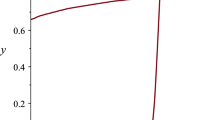Abstract
A survey is made of solvability theory for systems of complex linear inequalities.
This theory is applied to complex mathematical programming and stability and inertia theorems in matrix theory.
Similar content being viewed by others
References
R.A. Abrams, “Nonlinear programming in complex space: Sufficient conditions and duality”, (to appear).
R.A. Abrams, and A. Ben-Israel, “A duality theorem for complex quadratic programming”,Journal of Optimization Theory and Applications 4 (1969) 244–252.
R.A. Abrams, and A. Ben-Israel, “Nonlinear programming in complex space: Necessary conditions” Report No. 70-3, Series in Applied Mathematics (Northwestern University).
R. Bellman,Introduction to matrix analysis (McGraw-Hill, New York, 1960).
A. Ben-Israel, “Linear equations and inequalities on finite dimensional, real or complex, vector spaces: A unified theory”,Journal of Mathematical Analysis and Applications 27 (1969) 367–389.
A. Berman, and A. Ben-Israel, “Linear equations over cones with interior: A solvability theorem with applications to matrix theory”,Linear Algebra and its Applications (Forthcoming).
A. Berman, and A. Ben-Israel, “More on linear inequalities with applications to matrix theory”,Journal of Mathematical Analysis and Applications 33 (1971) 482–496.
A. Berman, and A. Ben-Israel, “A note on pencils of Hermitian or symmetric matrices”,SIAM Journal of Applied Mathematics 21 (1971) 51–54.
A. Berman, and P. Gaiha, “A generalization of irreducible monotonicity”,Linear Algebra and its Applications (Forthcoming).
N. Bourbaki,Espaces vectoriels topologiques (Hermann & Cie, Paris, 1953) Chs. 1 et 2.
J. Farkas, “Über die Theorie des einfachen Ungleichungen”,Journal fur die reine und angewandte Mathematik 124 (1902) 1–24.
P. Gordan, “Über die Auflösungen linearer Gleichungen mit reelen Ceoffizienten”,Mathematische Annalen 6 (1873) 23–28.
R.D. Hill, “Inertia theorems for simultaneously triangulable complex matrices”,Linear Algebra and its Applications 2 (1969) 131–142.
N. Levinson, “Linear programming in complex space”,Journal of Mathematical Analysis and Applications 14 (1966) 44–62.
A. Lyapunov, “Problème général de stabilité du mouvement”,Annals of Mathematics Studies 17 (Princeton University Press, Princeton, N.J., 1947).
M. Marcus and M. Minc,A survey of matrix theory and matrix inequalities (Allyn and Bacon, Boston, Mass., 1964).
H. Schneider, “Positive operators and an inertia theorem”,Numerische Mathematik 7 (1965) 11–17.
P. Stein, “Some general theorems on iterants”,Journal of Research of the National Bureau of Standards 48 (1952) 11–17.
E. Stiemke, “Über positive Lösungen homogener linearer Gleichungen”,Mathematische Annalen 76 (1915) 340–342.
O. Taussky, “MatricesC withC n → 0”,Journal of Algebra 1 (1964) 5–10.
R. Varga,Matrix iterative analysis (Prentice Hall, Englewood Cliffs, N.J., 1962).
Author information
Authors and Affiliations
Rights and permissions
About this article
Cite this article
Berman, A., Ben-Israel, A. Linear inequalities, mathematical programming and matrix theory. Mathematical Programming 1, 291–300 (1971). https://doi.org/10.1007/BF01584093
Received:
Revised:
Issue Date:
DOI: https://doi.org/10.1007/BF01584093




